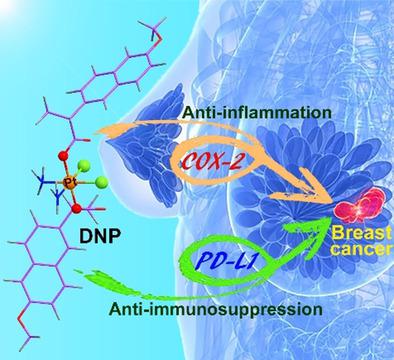当前位置:
X-MOL 学术
›
Angew. Chem. Int. Ed.
›
论文详情
Our official English website, www.x-mol.net, welcomes your feedback! (Note: you will need to create a separate account there.)
Multispecific Platinum(IV) Complex Deters Breast Cancer via Interposing Inflammation and Immunosuppression as an Inhibitor of COX-2 and PD-L1.
Angewandte Chemie International Edition ( IF 16.6 ) Pub Date : 2020-09-08 , DOI: 10.1002/anie.202011273 Suxing Jin 1 , Nafees Muhammad 1, 2 , Yuewen Sun 3 , Yehong Tan 3 , Hao Yuan 1 , Dongfan Song 1 , Zijian Guo 1, 4 , Xiaoyong Wang 3
Angewandte Chemie International Edition ( IF 16.6 ) Pub Date : 2020-09-08 , DOI: 10.1002/anie.202011273 Suxing Jin 1 , Nafees Muhammad 1, 2 , Yuewen Sun 3 , Yehong Tan 3 , Hao Yuan 1 , Dongfan Song 1 , Zijian Guo 1, 4 , Xiaoyong Wang 3
Affiliation

|
Breast cancer (BC) is one of the most common malignancies in women and often accompanied by inflammatory processes. Cyclooxygenase‐2 (COX‐2) plays a vital role in the progression of BC, correlating with the expression of programmed death‐ligand 1 (PD‐L1). Overexpression of PD‐L1 contributes to the immune escape of cancer cells, and its blockade would stimulate anticancer immunity. Two multispecific platinum(IV) complexes DNP and NP were prepared using non‐steroidal antiinflammatory drug naproxen (NPX) as axial ligand(s) to inhibit the BC cells. DNP exhibited high cytotoxicity and antiinflammatory properties superior over NP, cisplatin and NPX; moreover, it displayed potent antitumor activity and almost no general toxicity in mice bearing triple‐negative breast cancer (TNBC). Mechanistic studies revealed that DNP could downregulate the expression of COX‐2 and PD‐L1 in vitro and vivo, inhibit the secretion of prostaglandin, reduce the expression of BC‐associated protein BRD4 and phosphorylation of extracellular signal‐regulated kinases 1/2 (Erk1/2), and block the oncogene c‐Myc in BC cells. These findings demonstrate that DNP is capable of intervening in inflammatory, immune, and metastatic processes of BC, thus presenting a new mechanism of action for anticancer platinum(IV) complexes. The multispecificity offers a special superiority for DNP to treat TNBC by combining chemotherapy and immunotherapy in one molecule.
中文翻译:

多特异性铂(IV)配合物通过介入炎症和免疫抑制作为COX-2和PD-L1的抑制剂而阻止乳腺癌。
乳腺癌(BC)是女性中最常见的恶性肿瘤之一,通常伴有炎症过程。环氧合酶2(COX-2)在BC的发展中起着至关重要的作用,与程序性死亡配体1(PD-L1)的表达相关。PD-L1的过度表达有助于癌细胞的免疫逃逸,而对其的阻断将刺激抗癌免疫力。使用非甾体抗炎药萘普生(NPX)作为轴向配体来抑制BC细胞,制备了两种多特异性铂(IV)复合物DNP和NP。DNP具有较高的细胞毒性和抗炎特性,优于NP,顺铂和NPX。此外,它对患有三阴性乳腺癌(TNBC)的小鼠显示出有效的抗肿瘤活性,几乎没有一般毒性。在体内,抑制前列腺素的分泌,降低BC相关蛋白BRD4的表达和细胞外信号调节激酶1/2(Erk1 / 2)的磷酸化,并阻断BC细胞中的癌基因c-Myc。这些发现表明,DNP能够干预BC的炎症,免疫和转移过程,从而为抗癌铂(IV)复合物提供了新的作用机制。通过将化学疗法和免疫疗法结合在一个分子中,多特异性为DNP治疗TNBC提供了特殊的优势。
更新日期:2020-09-08
中文翻译:

多特异性铂(IV)配合物通过介入炎症和免疫抑制作为COX-2和PD-L1的抑制剂而阻止乳腺癌。
乳腺癌(BC)是女性中最常见的恶性肿瘤之一,通常伴有炎症过程。环氧合酶2(COX-2)在BC的发展中起着至关重要的作用,与程序性死亡配体1(PD-L1)的表达相关。PD-L1的过度表达有助于癌细胞的免疫逃逸,而对其的阻断将刺激抗癌免疫力。使用非甾体抗炎药萘普生(NPX)作为轴向配体来抑制BC细胞,制备了两种多特异性铂(IV)复合物DNP和NP。DNP具有较高的细胞毒性和抗炎特性,优于NP,顺铂和NPX。此外,它对患有三阴性乳腺癌(TNBC)的小鼠显示出有效的抗肿瘤活性,几乎没有一般毒性。在体内,抑制前列腺素的分泌,降低BC相关蛋白BRD4的表达和细胞外信号调节激酶1/2(Erk1 / 2)的磷酸化,并阻断BC细胞中的癌基因c-Myc。这些发现表明,DNP能够干预BC的炎症,免疫和转移过程,从而为抗癌铂(IV)复合物提供了新的作用机制。通过将化学疗法和免疫疗法结合在一个分子中,多特异性为DNP治疗TNBC提供了特殊的优势。


























 京公网安备 11010802027423号
京公网安备 11010802027423号